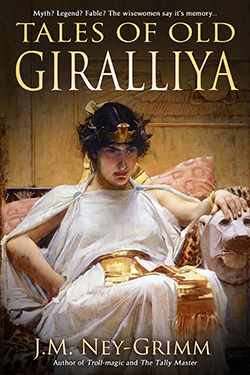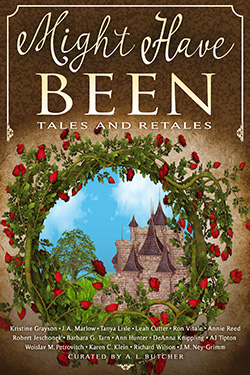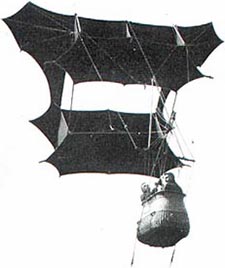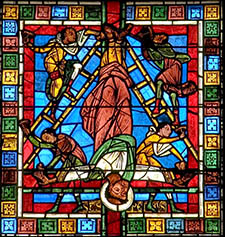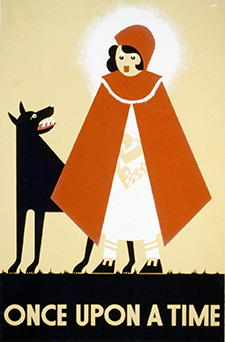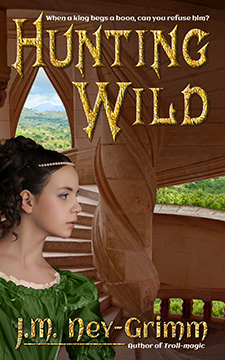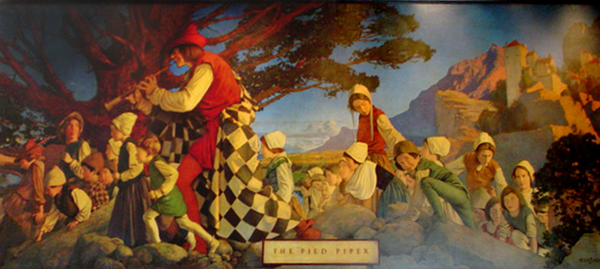 Gael paused in the passage at the bottom of the Regenen Stair.
Gael paused in the passage at the bottom of the Regenen Stair.
Well, it wasn’t the uttermost bottom. The lowest levels of the kitchen annex, slabbed onto the southeast side of the tower, lay a few twists below the forges. But the smithies—his smithies—occupied the foundations of the tower proper.
So he stood a moment, listening to the roaring of the furnaces, the clang of hammers on metal, the shouts of the smiths, and the hissing of quenched bronze, all of it echoing off massive stone piers and heavy stone groins.
This was his realm as much as the tally room. His tally room governed these vast, dark, hot vaults, lit only by the white orange glow escaping the forges and the whiter orange incandescence of the molten bronze.
More often than not, the smiths blanketed the deep embrasures of the tower arrowslits with leather hides, not needing sunlight because of the brightness of the heated metals; not wanting sunlight, because the darkness allowed them to better judge the precise moment when the molten metal had reached the right color—and heat—for pouring; or when the annealed metal grew ripe for tempering.
The Regenen Stair debouched at the back of the blade smithy.
Gael could see the scullion at the twin bellows. The inflating and deflating leather sacks pulsed like beating hearts, pushing air over the forge coals at just the right rate to produce the right heat. The smith and his sergeants were checking the blade mold, assuring themselves that the straps holding it closed were tight and assessing its temperature. The mold required heating to ensure that the molten metal would flow into it properly and would come out of the mold—once solid—without damaging it.
The heat of the smithy had not yet penetrated Gael’s suede robes, but the dry air baked the skin of his face and hands.
Yet he was not here to question the bladesmith. Not this time.
To the left of the blade smithy lay the tin smeltery and the grinding smithy, the smeltery close to the center of the vault where the furnaces for refining the tin glowed, the grindery at the perimeter of the tower’s foundation.
The mighty piers holding up the ceiling arches and the waist-high walls separating the different smithies hid much of the tin smeltery from Gael’s gaze. The grinding smithy was entirely veiled by curtains of leather hide. Perhaps Keir stood within them now, talking with the notary there. Gael did not see the boy elsewhere.
The grinding smith needed all the sunlight pouring through the embrasures on his side of the tower, so that he could be sure each blade was polished to perfection, its edge sharp and perfect, without flaw. The leather curtains contained the sunlight which would otherwise overwhelm the white orange glow of the forges that every other smith depended upon.
To Gael’s right, the fully walled storage rooms blocked his view of the copper smeltery and the privy smithy where he was headed.
He took a moment more to savor the smoothly working operation that the smithies had become. The smiths, their sergeants, and their scullions moved with assurance. The ring of hammer on bronze formed a sort of music. And, most important, the metal ingots entered the smithies, moved through them, and exited in the controlled flow that Gael had introduced.
When Gael took over their management at Lord Carbraes’ behest, each smithy had used a different tallying system—not one of which matched the other. Each smith had requisitioned ingots haphazardly, and sometimes a smithy went dark for an entire waxing moon merely because the tin vault lay empty.
Gael knew that the sure supply of the metals they needed generated the calm demeanor of the smiths, which flowed in turn to their underlings. Despite the heat and the din—the roar of the fires, the ring of pounding hammers, the shouted orders—these smithies were as much a haven for the workers of metal as the tally room was a refuge for he who counted.
Gael edged along the side wall of the blade smithy—the wall dividing the smithy from the storage rooms—and then along the back wall of the copper smeltery. He reached the privy smithy as Martell flourished a bronze ewer overhead.
“Ah! Ha, ha! Look at it! Look! Is it not fine?” Martell turned, his beaky nose with its small ornamental ring gleaming, and caught sight of Gael. “Look at the scrollwork where the handle meets the vessel! And these—the flourishes at the top where the spout attaches!” The smith strode toward Gael to hold the ewer for his close inspection. “Say I do good work!” he demanded, grinning. Sweat stood out on his brow and dewed the frizzles of his hair, escaping from its braid.
Gael smothered the smile on his lips, but let it reach his eyes. “You do good work,” he agreed.
“This ewer! The serving platter I completed this morning! And this! This, too!” Martell rummaged in a heap of utensils—kitchen knives, roasting spit jacks, awls—seized on a graceful bowl, and drew it out. “Magnificent! All of it! And to you I owe it all!” he exclaimed. “Before, it was always Martell who went short when the tin lacked, when the bronze was insufficient. But now—now Martell makes beauty to soothe the soul, and all Belzetarn is better because of it!”
Gael laid a hand on the smith’s arm. “That is true, my friend. May I have a word?”
Martell looked surprised. He shrugged, handed the bowl and ewer to one scullion, and turned to issue instructions to another. The afternoon was getting late, but evidently the privy smithy would be pouring at least one more item before they put their forge to bed.
Martell drew Gael around the massive pier separating the privy smithy from the armor smithy to the deeper shadows. “You have trouble, my friend. I sense it, I, Martell. But tell me!”
This was awkward, but Gael had been dealing with Martell’s enthusiasm for years.
“The trouble, my friend, is you.”
Martell looked more surprised yet. “But, no! How could this be? Martell is your most ardent supporter.”
Gael let a dry chuckle escape him. “Well do I know it, my friend. But this is the old trouble. The trouble with the tallies from the privy smithy.”
“Ah! Yes! The ingots coming in to the privy smithy are not matched by the weight of the beauty leaving it! Ah! I know this trouble, I, Martell! But I have explained, my friend. Art is not precise! Art requires passion! The tallying—it is anathema to the creativity. You understand this, my friend! Yes?”
Gael suppressed another smile. The issue was serious—missing tin, so precious tin—but Martell always amused Gael, even gave Gael joy. For Martell was one of Gael’s successes. The privy smith had been morose when Gael first arrived. Now he was ebullient, even while he made absurd claims. Martell might say that art needed precision less than it needed inspiration, but his art—made in metal—required great precision and care in the percentages of tin versus copper and in the heat applied to both.
Martell might be sloppy with the tallies he permitted his notary, but he was not sloppy with his medium.
“I do understand, my friend, but your tallies have slipped further from true yet again. I can allow you a few ounces, even up to half an ingot. But a full ingot’s worth is too far.”
Martell’s mouth, mobile beneath his beaky nose, drooped. “But, no, my friend! Surely not!”
Gael nodded firmly. “It is so, my friend. And I will need your good will to set it straight.”
Martell’s eyes brightened. “Ah! Then, trouble there is none, for you have my best will and always will! Tell me, and we solve it all!”
“I hope so,” replied Gael. “Will your good will extend to my notarius? To Keir?”
“But of course! Keir, he is your right hand. Courtesy to Keir is naught but courtesy to you!”
“Good. Because Keir will come down to your smithy in the morning after all the smiths have received their metals, and you must not start until after Keir has counted and tallied your ingots after their arrival. Can you do that, my friend?”
Dismay crossed Martell’s face. “Keir shall count my ingots?”
There was no point in adjuring Martell’s notary to tally more carefully. Martell had him utterly subjugated and would snatch the metal away before the notary was half done. But Keir was more than a match for Martell.
“Will you let Keir be my hands? For me, my friend?”
“Ah! For you, yes! For you I will do any and all! Ah!”
Gael patted Martell’s shoulder. “Good. And then again in the evening, when the scullion is ready to carry the finished implements, the residual metals, and any unbroken ingots away, you must send another scullion to fetch Keir from the bronze vault. And Keir will weigh the exiting material.” Gael overrode the smith’s voluble response. “For me, my friend. Will you do it?”
“Ah, ha!” broke in Martell. “I see it now! You doubt my notary!”
Gael shook his head. “I doubt your notary not at all. It is your own enthusiasm and haste that is the culprit, my friend. And those will not be stemmed by your devoted notary. You know it is so.”
“Ah, ha, ha! It is so. You know me, my friend, you do!”
Gael took Martell’s hand and grasped it. “I do know you, Martell. Will you help me thusly? Will you hold to your promise tomorrow, even in the rush of your artistry?”
Martell’s hand returned the pressure of Gael’s. “I will do it, yes. I make you my promise!”
“Good!” Gael patted the smith’s shoulder once more, withdrew his clasped hand, and moved back around the sheltering pier toward the copper smeltery. Behind him, Martell burst into voluble instructions to his underlings.
Next scene:
The Tally Master, Chapter 3 (scene 12)
Previous scene:
The Tally Master, Chapter 3 (scene 10)
Need the beginning?
The Tally Master, Chapter 1 (scene 1)




